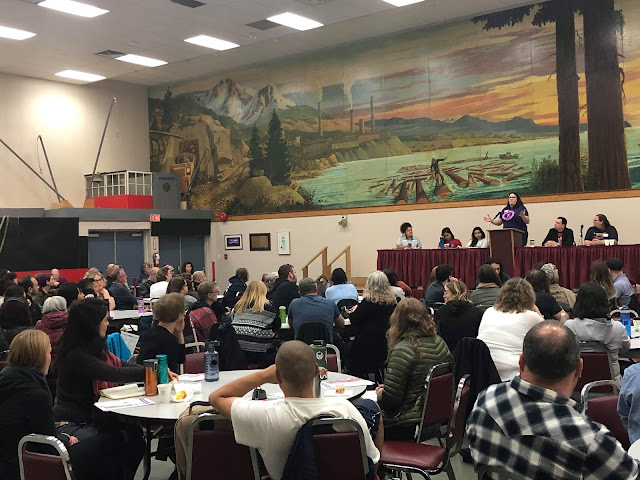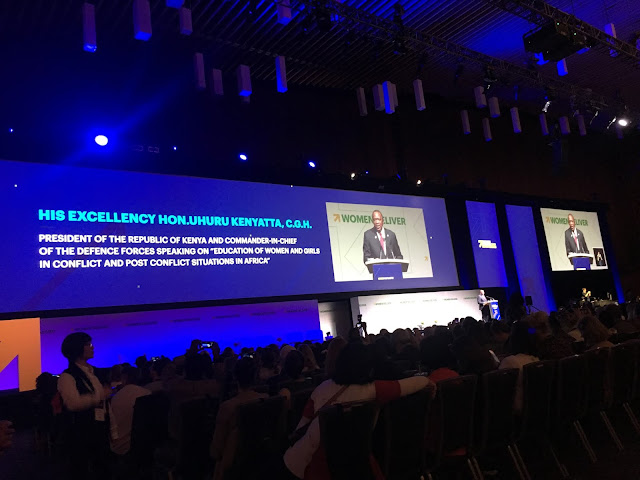Portland Troublemakers School
Last year I attended my first Labor Notes conference in Chicago and felt like I found my people in the labour movement. An organization that centres grassroots organizing, class analyses, equity and inclusion and worker power is for me and something that is missing in Canada.
I wrote at length about my experience there:
- Day One - Labor Notes Conference
- Stories from the West Virginia Teachers' Strike
- Day Two - Labor Notes Conference
- Day Three - Labor Notes Conference
When I saw that Labor Notes was having a Troublemakers School (TMS) in Portland over my birthday weekend, I knew I had to go! So I roped my pal Trish into coming with me and we roadtripped down to Portland for some coffee, donuts and organizing training. There's no other way I would want to spend my birthday than with 400 other union activists.
We drove across Portland to the Pacific Northwest Carpenters Institute. We entered the union hall, registered and grabbed seats. I met a woman from AFCMSE (our sister union) and immediately bought a book about women electricians in Seattle. Then the TMS was called to order.
Mark Brenner, former Labor Notes staffer and now director of the Labor Centre at the University of Oregon gave the opening remarks. Happy birthday to Labor Notes - they are 40 years old this year! For 4 decades they have been "putting the movement back in the labour movement." After the Janus decision last year there is an urgency to organize workers - union and non-union and workers are fighting back and winning. Whether it's the multiple teacher strikes (Washington, California, Oklahoma, West Virginia), locomotive workers in Erie, Pennsylvania or organizing drives at Amazon, and Volkswagen, our American friends are standing up and winning! It was a short intro and then we were off to our first workshop of the day.
Workshop 1 - Secrets of a Successful Organizer: Turning an Issue into a Campaign
Facilitators: Al Bradbury (Labor Notes), Jody Folkedahl (Parkrose Education Association), and Jason Sheckler (Carpenters Local 1503)
This workshop was packed. We started with the "get on the bus" ice breaker. I met workers from SEIU, Portland Nurses, Teachers from Vancouver, Washington, state employees, city employees, carpenters (lots of carpenters), retail workers, and postal workers.
We brainstormed on what campaigns are and what we came up with was pretty great:
- organized movement
- concerted action
- taking action together
- specific goal/demand
- collective action
At the end of the day we are looking to shift power and build members confidence in the movement.
So what makes a good campaign? An issue that is:
- widely felt
- deeply felt
- benefits many stakeholders
- solidarity!!!
 Then we sorted ourselves out by sector and had a conversation about how to create a winning campaign. I found myself in a group with an AFCSME member who was an air quality analyst, a Portland city parks employee, and a US postal worker. We talked about strategic community mapping and how to do it. We also talked about ensuring that it always comes back to centring the service and the people who deliver them. We talked about how we could mobilize members to tell their stories - on social media, in newsletters, opeds and information pickets.
Then we sorted ourselves out by sector and had a conversation about how to create a winning campaign. I found myself in a group with an AFCSME member who was an air quality analyst, a Portland city parks employee, and a US postal worker. We talked about strategic community mapping and how to do it. We also talked about ensuring that it always comes back to centring the service and the people who deliver them. We talked about how we could mobilize members to tell their stories - on social media, in newsletters, opeds and information pickets.
We all used the action thermometer and heard from various groups about a diversity of tactics. I've got lots of ideas now. Woot!
Keynote: Arlene Inouye - United Teachers of Los Angeles (UTLA)
Arlene Inouye is the Secretary and Bargaining Chair for the UTLA. She was there to talk about last year's UTLA strike - 34,000 members. We started with the video that shows #UTLAStrong
Educators are saving the American labour movement, breathing a new life into it. Educators made up 78% of the work stoppages in the US last year. As educators they have an enourmous advantage because they are in every community. Parents trust teachers and they brought them on board.
I didn't realize how bad privatization was in the American school system. After Hurricane Katrina, all schools were privatized. in Oakland, 1/3 of schools are private. Like teachers in BC, wages have been stagnent since the 1990s, higher class sizes and further loss in purchasing power after the recession.
47% of the membership are millennials. That is a high number.
The issues in Los Angeles aren’t that different than they are here in BC. They union was looking for hard caps on class size and composition. They wanted to fight increasing privatization by demanding a cap on charter schools, they wanted a nurse at all schools , access to childcare, green spaces, immigration defence fund, and support for adult education.
Because of the significant loss in membership over the years due to the rise in Charter Schools they had to mobilize like they have never done before. They held morning information pickets at 900 schools in 8 areas of the city.
Here’s how their strike played out:
Day 1 - march to the District Office
Day 2 - rally at the California Charter School Association
Day 5 - rally at City Hall
 They escalated each action adding more and more people to their team. People were excited to be part of something, to be fighting for the common good. Their creativity was unleashed - songs, chants, art on placards. They ideintified leaders at every school and organized around them.
They escalated each action adding more and more people to their team. People were excited to be part of something, to be fighting for the common good. Their creativity was unleashed - songs, chants, art on placards. They ideintified leaders at every school and organized around them.
This is where UTLA was starting to see a shift from going from a servicing model of a trade union to an organizing model. For the first time they hired parent organizers. For the first time they hired people to work in a research department. They created an extensive database that would track members’ participation in strike actions. Banners and placards were starting to be designed by kids in support of their teachers. It helped that the district’s management did a lot of stupid stuff - they told the UTLA that they weren’t allowed to talk to parents or that they couldn’t pass out union flyers. Too late. Parents were already backing the union - they had signs of support up in the windows of local businesses.
It also gave the union an opportunity to tell people what it was they did - so parents knew what speech pathologists did, why librarians were necessary etc.
They were looking for a raise in compensation - around 10%. They also voted in favour for a 30% dues increase!! 30%!! WOW!
At the end of the day, UTLA fought off the employer’s strategy of FUD. Fear. Uncertainty. Doubt. FUD is no match for solidarity, collective action, passion, justice and love. Together united, we'll never be defeated!
Si se puede!!
Workshop - Democracy is Power: Member Driven Unions
This workshop is what Labor Notes is all about. It’s about creating space to talk about worker power in our unions. There is often a huge disconnect between elected union leadership and rank and file members. In an organization like CUPE it’s inevitable. It’s a huge country (geographically) with a sizeable membership (680,000) - there’s no way anyone can have a decent handle on what is going on for that many workers. But, there are also multiple barriers and obstacles to participation and leadership - our constitution and structure are designed to exclude people to uphold the current power structure. That’s a blog post for another day. Back to Labor Notes…
So the session was packed. First we heard from Barbara Madeloni, formerly of the Massachusetts Teacher’s Association (120,000 members) now on staff at Labor Notes. She was part of a progressive caucus of union members who felt left behind by their statewide elected leadership who were busy cutting back deals at the expense of their membership. So the caucus decided to run against the establishment with the single goal of growing this caucus - they weren’t prepared for what happened next. She won. She was part of a 70 person executive board with only 7 allies. Yikes.
Arlene from UTLA told her story of she got involved in the union. One of the galvanizing issues for her was the increasing rates of military recruiters coming to high schools in poorer districts to recruit students to the armed forces. She learned how to organize and mobilize and build community coalitions which translated into union activism.
Amanda Hill from the Oregon Federation of Nurses and Health Professionals spoke to us about how they ran a 10 member slate to defeat the long serving leadership of the union. They ran on a campaign of improved communication and outreach and established a robust steward assembly where communication between the statewide union and the stewards on the shop floor is two-way.
Rex Dominguez, a meat cutter at Fred Meyer is part of a caucus of UFCW called "Retail Workers for a Democratic Union." He talked about how in his local stewards were arbitrarily appointed, not elected as the constitution says, leading to a lot of croneism and distrust on the shop floor.
We then had a really interesting conversation as a whole group. I couldn't help but point out that union governance structures have always been designed to exclude people, to keep the status quo especially the broader you go. Union leadership at a federal or national level is extremely political and disconnected from the rank and file membership. Given the context and compensation it is easy to fall into the mentality of worrying about your next election rather than advancing the worker's agenda. That approach to trade unionism, coupled with neoliberal electoral politics keeps the same people in power.
So how do you break the cycle? How can you take best practices from other governance models to fit your organization? What can be done to truly advance equity and inclusion in the union? How can we take politics out of some decision making? How can we ensure that we aren't just replicating the same structures and issues we criticize the corporate world for?
We didn't get to any of the answers but we had frank conversations about what union democracy is and could be.
Maybe some questions for us to discuss with our members when we get home. I would love to have some of these conversations with my people.
Questions for discussion:
What do we mean by union democracy?
When/Why/How do we run?
What’s the role of leadership?
What’s the role of the caucus?
How do ensure you don’t get sucked into the bureaucracy and/ or the culture you're trying to disrupt ?
Conclusion
We met up again in the main hall for a wrap up session. There's a lot we can learn from the urgency of the times from our American friends. There's a lot in common in the struggle and that is where worker power lies. Together.
Labor Notes always ends their events with a worker's song - this time based on a Frederick Douglass quote - "Power concedes nothing without a demand. Never has. Never will."






Comments
Post a Comment